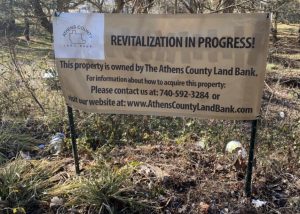News
Board Tasked To Deal With Run Down Properties Not Without Its Critics
By: David Forster
Posted on:
ATHENS, Ohio (WOUB) — A relatively unknown government entity that has the power to foreclose on abandoned properties was drawn into the spotlight Tuesday at the Athens County Board of Commissioners meeting.
Jill Thompson, the Athens County auditor, told the board she has concerns about the way the Athens County Board of Revision operates that may deprive people of their right to fair compensation when property is taken from them.
Thompson is one of three Athens County officials who sit on the board of revision. The other two are Treasurer Ric Wasserman and Commissioner Chris Chmiel.
Under state law, the board has the power to foreclose on vacant and abandoned property if taxes are not being paid. The board can then turn the property over to the Athens County Land Bank, a nonprofit corporation administered by government officials, which decides what to do with it. This includes putting it up for sale.
Under this process, no back taxes end up getting paid into the county coffers and no money is paid to any property owners. However, the homes on these properties are typically in such bad shape that they’re worth less than the taxes owed.
There wouldn’t be anything left over for the property owner anyway, Wasserman said. And there are opportunities throughout the process for property owners to assert their rights.

One of Thompson’s concerns is the county treasurer is directly involved in every step of the process: The treasurer is involved in the decision to recommend properties to the board of revision for foreclosure, then votes on the foreclosure as a member of the board and then weighs in on what to do with the property as chair of the land bank.
Thompson said this vests a lot of power in the hands of one government official and creates the potential for impropriety.
“It just doesn’t pass the smell test,” she said after the meeting. “There should be more independence in there.”
Thompson also raised concerns about whether sufficient efforts are made to notify property owners of the foreclosure action so they have a reasonable opportunity to challenge it or pay the past-due taxes.
Wasserman said after the commissioners’ meeting that state law requires the county treasurer sit on both the board of revision and the land bank. He also said the requirements for notifying property owners are spelled out in state law and these are followed in all foreclosures.
If for some reason property owners are not properly notified and lose their property to foreclosure, Wasserman said, they can go to court to challenge the action and seek fair compensation.
It was clear from Thompson’s comments during and after the commissioners’ meeting that more than anything, she does not like the idea of using the board of revision to foreclose on property. She said this creates the potential for taking property without fair compensation in violation of the state and federal constitutions.
These concerns have been raised by other critics in lawsuits filed in both state and federal courts.
Until fairly recently, foreclosures in Ohio were all handled through the courts. Then came the national foreclosure crisis in the mid-2000s, which left many communities littered with abandoned homes that became neighborhood eyesores and in some cases hotspots for criminal activity. Waves of foreclosures clogged the courts.

The Ohio Legislature passed a law in 2006 that created an alternate route for foreclosures on vacant and abandoned properties with past-due taxes: Counties could use their existing boards of revision to process the foreclosures, instead of the courts, and then turn the properties over to land banks to sell them or find some other use for them.
The board of revision’s traditional role is to hear complaints about property valuations used to set property taxes.
Foreclosures handled through the board are called administrative foreclosures because they are done by the executive branch and not the courts. These foreclosures are done under an expedited process that is also available through the court system.
First, the county auditor has to declare the property owner is delinquent on their taxes. One year after that the process can begin, said Athens County Prosecutor Keller Blackburn.
The county treasurer can then recommend the property for foreclosure.
The prosecutor’s office conducts an investigation to try to locate anyone with an ownership interest in the abandoned property. Efforts have to be made to notify anyone with an ownership interest of the foreclosure action, following the same procedures required for expedited foreclosures processed through the courts, Wasserman said.
At any point up until the foreclosure is finalized, someone with an ownership interest in the property can come forward and ask that the case be handled through the courts instead of the board of revision. If this happens, the board must transfer the case to court and the process starts over.
If the case stays with the board, it holds a public hearing on the foreclosure. The hearings are recorded and any documents submitted as part of the case are kept in a file maintained by the county court clerk.
Even after the foreclosure is finalized, there is a 28-day window in which the back taxes can be paid and the foreclosure halted. The county treasurer might even agree to some kind of payment plan. The foreclosure can also be appealed in court.
The whole process takes about six to seven months, Wasserman said. This is a couple of months less than going through the courts, making administrative foreclosures an attractive option for dealing with abandoned properties that have become a nuisance in their communities, he said.
“If you’re living next to one of these properties, you want them taken care of as soon as possible.”

Wasserman added foreclosures through the board of revision happen in much the same way as expedited foreclosures handled through the courts, with safeguards in place to protect the rights of property owners.
In the end, Blackburn said, it doesn’t really matter whether the foreclosure is processed by the board or the courts.
“Are you delinquent? If you are, you’re going to lose unless you pay your taxes.”
Once the foreclosure is completed, the board can transfer the property to the land bank. At this point, any tax liens or ownership interests in the property are extinguished.
This is the source of some of the criticism over the administrative foreclosure process that has led to lawsuits in state and federal court.
Foreclosed properties can be put up for auction, and when that happens the proceeds are used to pay off the back taxes and cover the costs of the auction. If there’s any money left, it goes to the property owner if one can be found.
But if the property goes to the land bank, this doesn’t happen. The back taxes are not paid and the property owner is not paid. Instead, if the land bank sells the property, it keeps the money to help fund its operations.
A lawsuit filed in state court by a property owner in Cuyahoga County argued that taking property without compensating owners for their equity in the property violates the state and federal constitutions. The Ohio Supreme Court ruled on the case last year. The court issued a narrowly drawn opinion in which it did not address the constitutional issues raised in the lawsuit but instead said the board of revision was acting within the scope of the authority granted to it by the Legislature.
Another similar lawsuit, also involving an administrative foreclosure in Cuyahoga County, is pending in federal court. That lawsuit was intended to be a class action on behalf of all Cuyahoga County property owners who because of an administrative foreclosure lost the equity they had in a property. But the judge denied class certification in December, meaning the case can only proceed with the original plaintiff. The lawsuit is on hold while the plaintiff appeals the decision.
Wasserman said if he thinks a property will sell for enough at auction to at least pay off the back taxes, he’ll go that route. The properties that instead get transferred to the land bank, he said, are the “worst of the worst.”
For example, Wasserman said the board or revision is moving to foreclose on a home on Main Street in Glouster that has been abandoned for at least a decade. The house is hollowed out, the windows are broken, and there’s $22,000 in back taxes owed.
It’s unlikely the house would sell at auction for enough to cover the taxes and the cost of the auction, he said. And if it doesn’t sell, there are multiple steps that must be taken to find another government entity willing to take the property before it can be transferred to the land bank, which is often where it ends up. This all adds more time and cost to the process as opposed to going straight to the land bank in the first place, according to Wasserman.
In some cases, the land bank ends up spending several thousand dollars tearing down a home because it’s too far gone, Wasserman said. Or it might invest in getting the home to the point where it can be sold.
In either case, the land bank earns little in return. If the home is removed, it might sell the empty lot to a neighbor for a couple hundred dollars. Wasserman said the most the land bank has ever sold a home for is $7,000, and that was a donated home in better shape than most of the foreclosures.
“There are no houses we get that are ever going to sell for 50 grand, that’s for certain,” he said.
Wasserman said there are advantages to having the land bank handle the property instead of putting it up for auction. The land bank is not required to accept the highest bid for a property and instead can focus on what potential buyers intend to do with the property and what’s best for the community. He said the land bank also does background checks on potential buyers to make sure they’re paying their property taxes and do not have a history of housing code violations or a recent bankruptcy.
The land bank, Wasserman said, “doesn’t want bottom-fishing landlords.”

